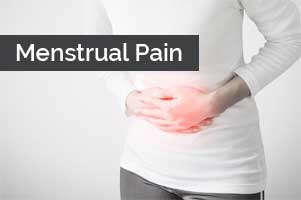- Home
- Editorial
- News
- Practice Guidelines
- Anesthesiology Guidelines
- Cancer Guidelines
- Cardiac Sciences Guidelines
- Critical Care Guidelines
- Dentistry Guidelines
- Dermatology Guidelines
- Diabetes and Endo Guidelines
- Diagnostics Guidelines
- ENT Guidelines
- Featured Practice Guidelines
- Gastroenterology Guidelines
- Geriatrics Guidelines
- Medicine Guidelines
- Nephrology Guidelines
- Neurosciences Guidelines
- Obs and Gynae Guidelines
- Ophthalmology Guidelines
- Orthopaedics Guidelines
- Paediatrics Guidelines
- Psychiatry Guidelines
- Pulmonology Guidelines
- Radiology Guidelines
- Surgery Guidelines
- Urology Guidelines
Acupressure leads to sustained reduction in menstrual pain

Approximately 50 to 90 percent of young women experience pain during their periods which manifests itself as lower abdominal cramping. Acupressure is a technique derived from traditional Chinese medicine (TCM) which involves massage or pressure being applied to specific points on the body.Prof. Dr. Claudia Witt of the Institute of Social Medicine, Epidemiology and Health Economics, and co-researchers from Charité -- Universitätsmedizin Berlin conducted a Study and found that Acupressure was not only effective in relieving menstrual pain and it led to its sustained reduction. The results of Study have been published in the American Journal of Obstetrics and Gynecology.
The researchers wanted to evaluate whether, in a group of women suffering from severe menstrual pain, aged between 18 and 34, self-acupressure would be more effective at achieving a sustained reduction in menstrual pain than usual care alone (e.g. pain medication and hormonal contraceptives). A total of 221 participants were randomly assigned to one of two treatment groups, both of which received a study app and short introduction. Acupressure-based features -- with instructions on how to administer self-acupressure shortly before and during menstruation -- were only made available to the intervention group. One advantage of an app-based intervention is its ability to provide visual descriptions of the pressure points users need to target in order to achieve the desired effect. It can also send regular reminders. Additionally, the app was used to collect all study-related data.
"Initially, we simply wanted to conduct a study on the use of self-care techniques for menstrual pain. However, the women who were involved during the planning stages, all of whom were affected by menstrual pain, wanted an app," reports the study's principal investigator, Prof. Dr. Claudia Witt of the Institute of Social Medicine, Epidemiology and Health Economics. The app helped participants to apply simple self-acupressure techniques to three different acupressure points.
After three months, 37 percent of participants in the acupressure group reported a 50 percent reduction in pain intensity. After six months, this proportion had increased to more than half of the women in this group (58 percent). Only 25 percent of women in the control group reported a similar reduction in pain intensity at both the 3-month and 6-month marks. Women in the acupressure group also used less pain medication than women in the control group and reported lower levels of pain overall.
"We were surprised to see that, after six months, two-thirds of participants continued to use self-acupressure. So far, research into the clinical effectiveness of apps has been limited, and only a few have been tested using randomized controlled trials," says Dr. Daniel Pach of the Institute of Social Medicine, Epidemiology and Health Economics. He adds: "We were able to show that apps can be evaluated in a clinical trial setting. However, despite our experience with conventional clinical trials, there was a lot for us to learn -- something we found both exciting and eye-opening." The app Luna has recently been updated and optimized for use with iOS.
For more details click on the link: DOI: 10.1016/j.ajog.2017.11.570
Dr Claudia WittDr Daniel Pachhormonal contraceptivesmenstrual painsevere menstrual paintraditional Chinese medicine
Source : with inputs American Journal of Obstetrics and GynecologyNext Story
NO DATA FOUND

Disclaimer: This site is primarily intended for healthcare professionals. Any content/information on this website does not replace the advice of medical and/or health professionals and should not be construed as medical/diagnostic advice/endorsement or prescription. Use of this site is subject to our terms of use, privacy policy, advertisement policy. © 2020 Minerva Medical Treatment Pvt Ltd